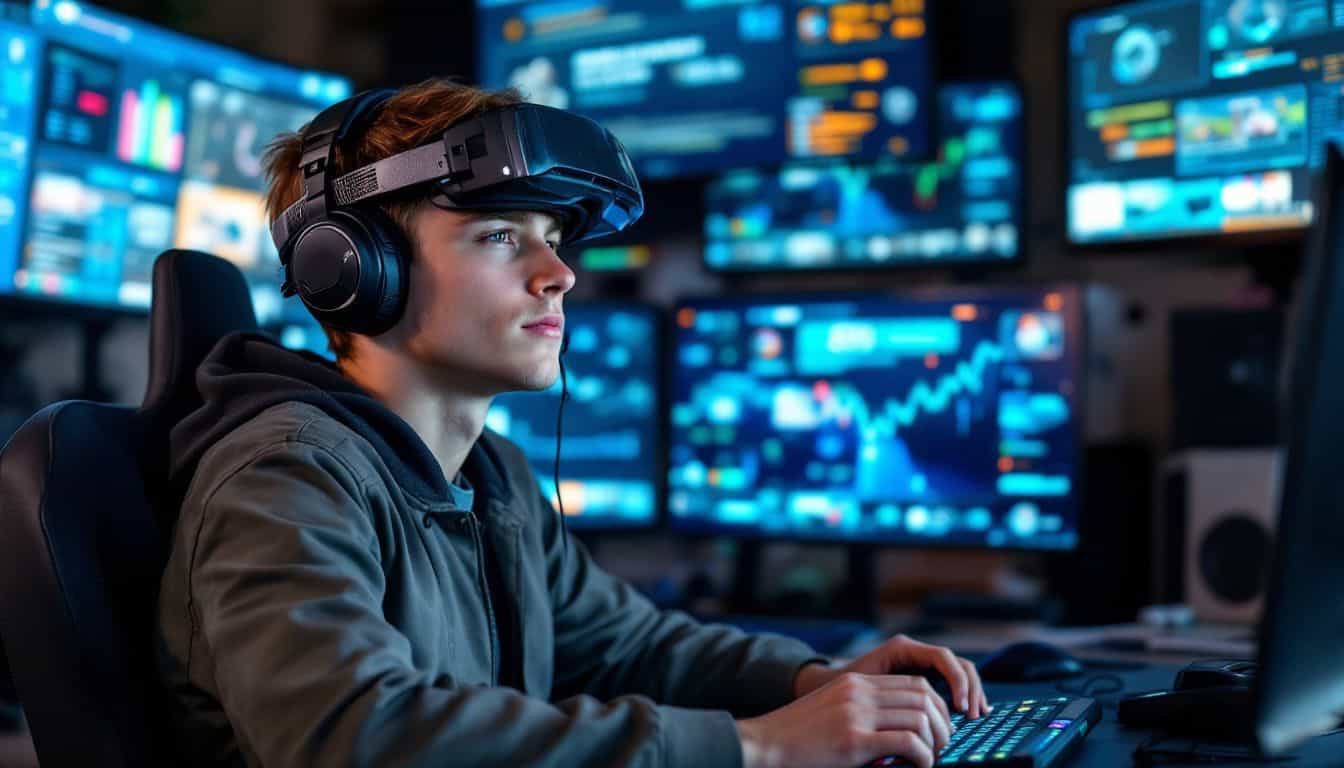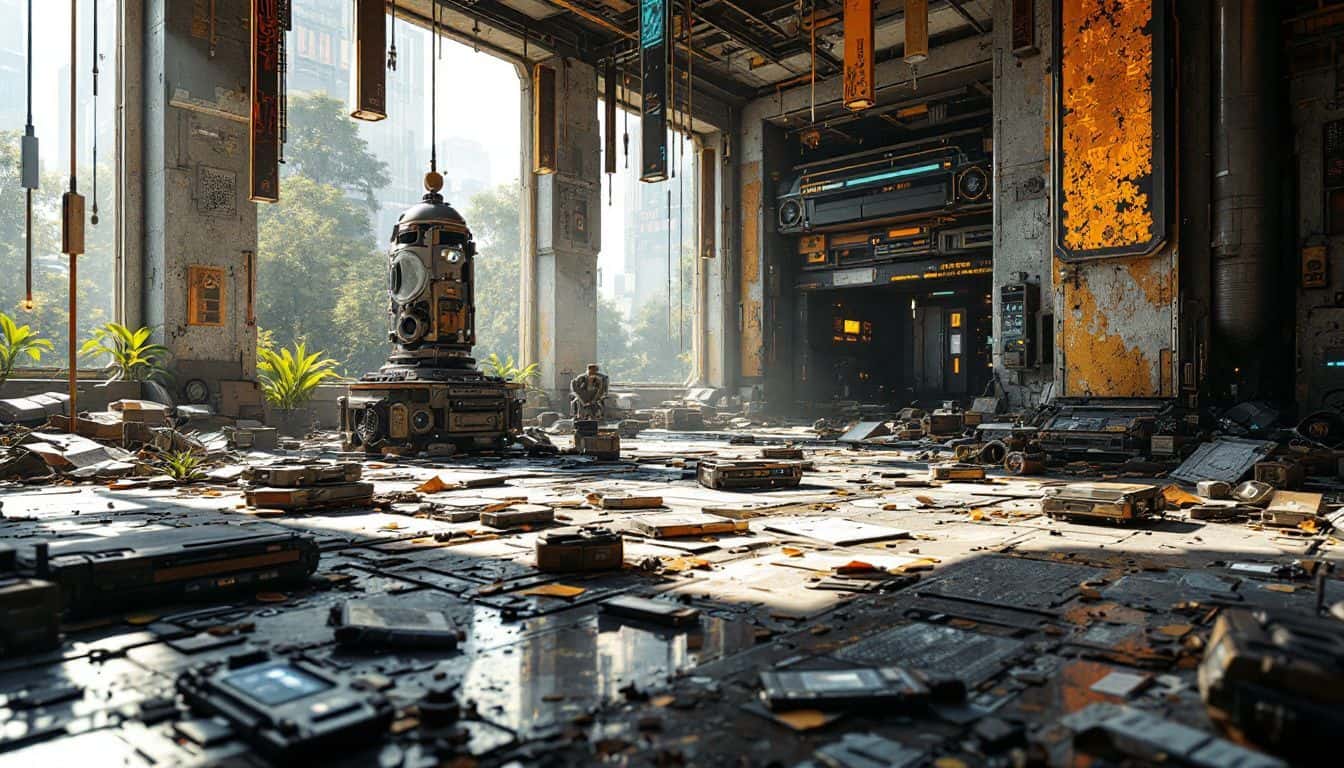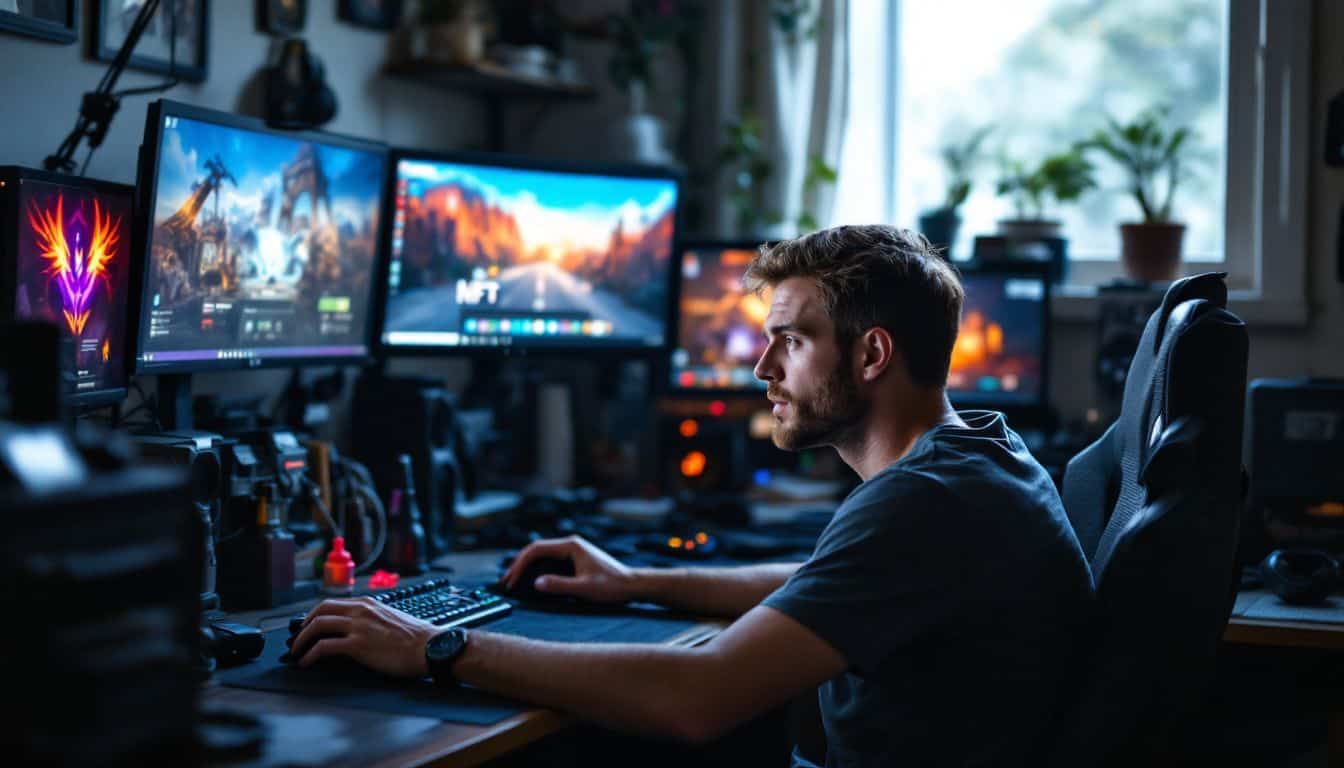Tired of games where you own nothing? GameFi lets you truly own in-game items. This article explores 7 benefits of blockchain gaming. Discover how blockchain games offer real ownership, secure transactions, and new ways to earn.
Ready to level up?
Key Takeaways
Blockchain gaming revolutionizes digital ownership by allowing players to truly own their in-game assets through NFTs and cryptocurrencies, unlike traditional gaming where items remain company property.
Enhanced security is a major benefit, with blockchain technology providing immutable transactions, fraud prevention, and transparent verification systems that protect players’ digital assets.
The play-to-earn model enables players to earn real money through gameplay, with market projections showing growth to $435 billion by 2028.
Interoperability is a key feature, allowing players to use their digital assets across different games and platforms, increasing both utility and value.
While promising, blockchain gaming faces challenges including technical complexities and evolving regulations, requiring careful navigation by developers and players alike.
Table of Contents
Understanding Blockchain Gaming

Blockchain gaming uses blockchain technology—like cryptocurrencies and NFTs. Think Bitcoin and Ethereum for in-game economies. Gamers now own their digital assets. This means true ownership.
Smart contracts make secure trades possible. According to bestcryptocasinos.ltd, one of the top online crypto-powered casinos, transparency is key.
Blockchain reduces cheating and fraud. Decentralization boosts security. No single point of failure exists. User-friendly designs help everyone join in. 2024 is a big year for blockchain gaming.
Reshaping the gaming sector is underway. Ready for the key advantages?
Key Advantages of Blockchain in Gaming

Blockchain changes games. It gives players real ownership and ways to earn. Want more? Read on….
Secure Transactions and Transparency
 Cryptographic security protects transactions and player data. Transactions on blockchains are secure. They are also immutable. This enhances security for players. Transparency lets players verify transactions.
Cryptographic security protects transactions and player data. Transactions on blockchains are secure. They are also immutable. This enhances security for players. Transparency lets players verify transactions.
They can check ownership histories through a public ledger, a decentralized ledger. Smart contracts automate in-game transactions. They improve trust among players. This helps with in-game assets and digital currency.
Each transaction is tamper-proof. It resists fraud. Crypto wallets and two-factor authentication add extra security. Don’t understand cryptocurrency? Learn more here.
Ownership Rights of Digital Assets

Blockchain changes digital ownership. NFTs give gamers true ownership. Players own in-game assets. These include items and characters. Centralized platforms used to restrict this. Smart contracts create decentralized economic systems.
Players can securely trade and earn. Blockchain’s ledger shows asset distribution. It also shows gameplay rules. This creates transparency. Decentralization enhances security. It protects player data and in-game assets.
Interoperability between games increases asset value and utility. This leads to improved player experience….
Earning Potential Through Gameplay

Crypto gaming changes how players earn. Players control their digital assets. They can make money from gameplay. 75% of online gamers want to trade virtual items for cash. Crypto makes this easy.
Players verify ownership and trade in-game products. This creates profit. Crypto transactions are borderless. Global players can earn more. Forget old gaming money models. Earn cryptocurrency by playing.
Axie Infinity rewards players for time and effort. Players earn crypto tokens and NFTs. This is play-to-earn.
Improved Player Experience

Blockchain boosts digital ownership with NFTs. Players control and trade in-game assets. This increases engagement and monetization. Community governance gives players more say in game development.
Blockchain’s ledger ensures transparent asset distribution and gameplay. User-friendly interfaces make asset management easy. Advanced encryption protects transactions and privacy.
Players earn through gameplay. This adds value for money. Blockchain improves the player experience.
The best way to predict the future is to create it. – Abraham Lincoln
Blockchain networks improve the gaming experience. Players have true ownership of their digital items. They can trade items on various platforms. This creates a virtual economy. Immutable transactions ensure fairness.
Transparency builds trust. This creates a better gaming environment for everyone.
Enhancing Security in Gaming with Blockchain

Blockchain adds a strong layer of security to games. Want safer transactions and fewer cheaters? Read on….
Verification of Immutable Transactions
Immutable (IMX) and Blockaid partnered to boost security. This helps verify transactions. This partnership covers over 380 Web3 games. About 3 million players gain better security.
Blockaid uses Intelligent Contract Analysis. This helps verify transactions. The system scans 4.5 billion transactions. This ensures immutability and integrity. Transparent transactions are key for gamers.
They want to know their in-game currency and digital assets are safe. This tech helps stop fraud. Want to learn more about crypto vs fiat? Check out this resource: crypto vs fiat.
NFTs add another layer of security and ownership.
Minimization of Fraud Risks
Blockchain tech stops fraud. It uses encryption. This protects your data and in-game assets. Every transaction gets recorded. These records can’t be changed. This makes fraud tough.
Decentralized systems help. They spread out information. This is safer than one big database. Data leaks are less likely. Secure transactions build trust. Improved verification methods prevent fraud.
This means safer digital item ownership and crypto transactions.
NFTs and Their Influence in Blockchain Gaming

NFTs are changing digital ownership in games. Want unique items? Learn how NFTs work with Ethereum and other blockchains.
Exclusive Ownership of Items
You own your digital stuff. Think swords, skins, characters—they’re yours as NFTs. Web3 gaming makes this happen. Trade them. Sell them. These digital assets have real value. This boosts player investment and engagement.
Use your items across different games. Blockchain allows this interoperability. Crypto assets gain value through gameplay. This changes everything. Cryptocurrencies simplify in-game purchases.
The best way to predict the future is to create it. – Abraham Lincoln/Peter Drucker (Attribution varies)
Now, let’s explore the role of cryptocurrencies…
Interoperability and Trading on Various Platforms
Trade NFTs across different games. This breaks down walls between gaming worlds. Imagine using your sword from one game in another. Interoperability makes this possible. Blockchain tech makes these NFT trades secure.
It proves you own the items. This boosts the value of your digital stuff. You control your unique items. This creates strong virtual economies. Developers earn royalties on NFT resales.
This adds new income streams. The blockchain gaming market will hit $435 billion by 2028. Interoperability makes in-game assets more useful. It also makes them worth more.
Role of Cryptocurrencies in Enhancing Gaming

Crypto fuels in-game economies. Digital coins simplify global payments and unlock new financial models for players and developers, like play-to-earn. Want to learn more? Keep reading….
Simplification of In-Game Purchases
Secure payments are a feature of blockchain games. These games use native crypto tokens. This ensures transaction safety. Cryptocurrencies simplify in-game purchases. They allow seamless transactions.
Players convert in-game currencies into real-world value. They use cryptocurrencies. Decentralized exchanges facilitate peer-to-peer trading. Smart contracts govern these trades. This provides true asset ownership and value.
Enabling Worldwide Transactions
Crypto lets you own and sell in-game items. Trade in-game currency for real money. Decentralized exchanges use smart contracts. They help with peer-to-peer trading of digital assets.
NFTs let gamers buy, sell, and trade unique items. This creates a secondary market. Crypto wallets and decentralized platforms make transactions safer. Crypto transactions are borderless.
This means more earning potential for players worldwide. Gamers can trade cryptocurrencies.
Illustrative Cases of Blockchain in Games

Want to see blockchain games in action? Check out projects like Axie Infinity or The Sandbox for real-world examples of these concepts.
Exploring Decentraland
Decentraland is a virtual reality platform. It uses blockchain technology. Users buy digital land. These digital lands are NFTs. Users build virtual businesses. Think shops and entertainment venues.
Smart contracts manage community governance. Economic models are transparent. Users participate in a decentralized virtual economy. NFTs represent ownership of virtual land and assets.
This gives users true ownership. They control their digital property.
Gameplay Dynamics in Gods Unchained
Gods Unchained uses blockchain. This lets players truly own cards as NFTs. Each card is unique and tradable. Players buy, sell, and trade cards on cryptocurrency exchanges. This creates a dynamic play-to-earn ecosystem.
Skilled players earn real money. 3 million players benefit from secure transactions in the Immutable X ecosystem. Smart contracts verify every transaction. This minimizes fraud. Gods Unchained merges gaming and decentralized finance (DeFi).
It uses distributed databases. Players control the game’s future through DAOs (decentralized autonomous organizations).
Trading in CryptoKitties
CryptoKitties uses non-fungible tokens (NFTs). Each digital cat is unique. You own your CryptoKitties. Trade them. It’s like a real economy—inside the game. Blockchain makes it safe.
This showcases digital collectibles. This shows tradeability. Blockchain gaming grew 2000% in 2022 from 2021. Investors put over $2.5 billion into blockchain gaming.
Emerging Trends in Blockchain-Based Gaming

Metaverses and play-to-earn are gaining traction. Want more? Explore DAOs and cryptocurrency’s role in these digital spaces.
Expansion of Metaverse Integrations
Blockchain secures Metaverse items. NFTs verify ownership. AI builds 3D worlds and improves interactions. Decentralized AI helps Metaverse scale. Blockchain manages digital assets and peer-to-peer transactions.
This improves user experience and addresses privacy concerns. Think digital identity and immersion. This tech combo offers new ways to play and earn in immersive environments. Imagine trading NFT collections in Decentraland.
Players control their in-game items. They earn through play-to-earn models.
Increased Engagement in Earning Models
Play-to-earn (P2E) games are changing things. Players earn tokens. They trade these tokens for real money. Axie Infinity showed how this works. Daily trading in blockchain games is up almost 9% as of August 2024.
The market is growing fast—about 12% each year. Players own in-game items as NFTs. They trade and sell these digital assets. This adds real value to their game achievements. This attracts more players.
It also brings in more developers. The decentralized metaverse could be worth $8 trillion. GameFi mixes gaming and decentralized finance (DeFi). This opens up new ways to make money.
This also boosts player engagement. Players find new incentives in these games. They’re not just playing for fun—they’re playing to earn.
Exploring Challenges in Blockchain Gaming

Blockchain games face hurdles. Further research into Decentralized Autonomous Organizations (DAOs) and smart contracts can illuminate these issues.
Addressing Technical Complexities
Scalability issues plague blockchain games. Transaction speeds lag. This impacts gameplay. Interoperability offers a solution. Assets gain value through cross-game use. This boosts the market.
The blockchain gaming industry expects to hit $435 billion by 2028. Smart contracts and tokens will improve. According to the blockchain gaming experts at Geek Extreme, it’s easier than ever to make your own blockchain games, which helps address some of the issues with current blockchain gaming infrastructure.
These advancements will enhance usability. They will streamline data security. Decentralized Autonomous Organizations (DAOs) offer another path. DAOs improve game governance. They enhance player empowerment.
These changes benefit players and developers. They promote growth in the blockchain gaming space. Gamers can trade NFTs like CryptoKitties. They can play-to-earn in games like Gods Unchained.
This creates new opportunities. It increases interest in the metaverse. This impacts digital identities. It changes how we play.
Navigating Regulatory Landscapes
Gov’t rules change. These changes affect blockchain gaming. Developers, investors, and players must know the rules. Companies must follow financial laws. Token sales and initial coin offerings (ICOs) face scrutiny.
Are tokens securities? That’s a big question. Data privacy is key. Games collect personal data. GDPR and other laws matter. Know Your Customer (KYC) and Anti-Money Laundering (AML) rules are critical.
Companies must follow these rules. The global video game market is huge. It will reach $455.27 billion by 2024. Blockchain gaming is growing fast. The market is now $4.6 billion. It will hit $65.7 billion by 2027.
Compliance is vital for success.
People Also Ask
What’s the big deal with NFT games?
NFT games use NFTs. These are like special game items you own. Think swords, skins, or land. You can buy, sell, or trade them, just like real things. This gives players more control.
How do blockchain games make money for players?
Blockchain games offer “play to earn” options. Complete quests, farm for items—earn crypto like Bitcoin-Cash or Shiba-Inu, or even USDT. It’s a new way to make money while having fun. Just like Axie Infinity… though, remember the Axie Infinity hack. Be careful.
Are blockchain games safe?
Blockchain games use a decentralized blockchain. This makes them safer from fraudsters. Unlike using your credit card with EA Sports (Electronic Arts), your items are yours. No one can take them away. This also helps with authenticity. No fake items here.
Can I support game makers directly?
Yes! Some games use crowdfunding campaigns. This lets players invest. It’s like pre-ordering, but better. You can own a part of the game. It’s a new way to support the games you love.
Are NFT games hard to learn?
No. Many are like regular video games. They have quests and rewards. You just also learn about tokenization, liquidity, and money management. It’s like learning a new skill while playing. You can even share your wins on Twitter, like many have tweeted.
References
https://medium.com/@devstree.au/top-5-benefits-of-blockchain-game-development-in-2024-d931e5934cf3
https://www.linkedin.com/pulse/future-blockchain-gaming-beyond-play-to-earn-dave-balroop-t9sqc
https://www.rapidinnovation.io/post/blockchain-game-development-everything-you-need-to-know
https://chainplay.gg/blog/benefits-of-using-cryptocurrencies-in-gaming/
https://www.appventurez.com/blog/role-of-blockchain-in-gaming
https://blockchain.news/news/immutable-enhances-web3-gaming-security-blockaid-integration
https://www.computer.org/csdl/magazine/co/2024/10/10687346/20tjdHbxuTK
https://www.rapidinnovation.io/post/web3-game-development-the-comprehensive-guide-you-need
https://www.rapidinnovation.io/post/nfts-and-blockchain-the-future-of-gaming-and-entertainment
https://sdlccorp.com/post/the-role-of-cryptocurrencies-in-future-gaming-economies/
https://medium.com/@shflux/exploring-gaming-within-blockchain-c79bf9867619
https://wires.onlinelibrary.wiley.com/doi/full/10.1002/widm.1556
https://nftnewstoday.com/2024/10/24/web-3-gaming-to-explode-by-2030-nansens-latest-report/
https://sdlccorp.com/post/business-implications-of-regulatory-changes-on-blockchain-gaming/ (2024-08-28)
https://www.morpher.com/blog/blockchain-gaming (2024-07-30)

